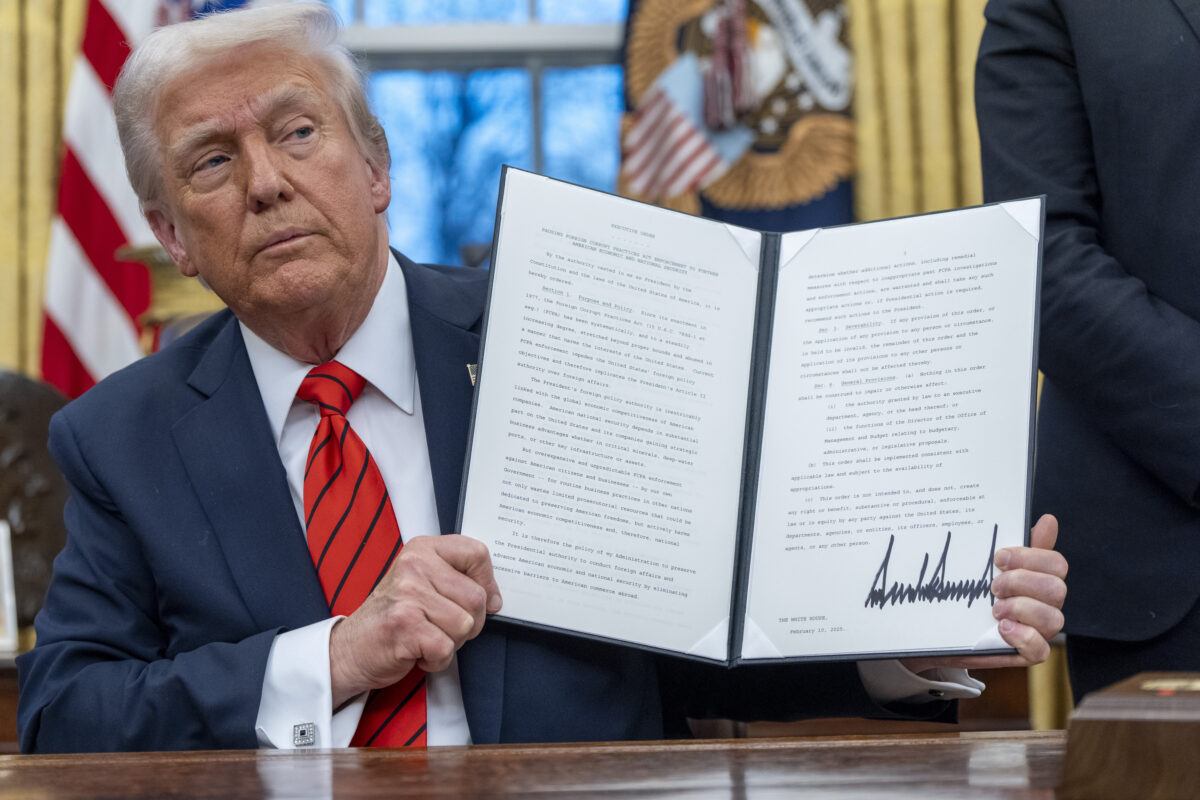Exasperated Judge Smacks Down Trump Executive Order by Dropping 26 Exclamation Marks in Ruling

AP Photo/Alex Brandon
It is extraordinarily rare to see a judge use an exclamation point in a written opinion, but one federal judge deployed more than two dozen on Tuesday to strike down one of President Donald Trump’s executive orders targeting a law firm.
Since the beginning of his second term, Trump has issued a series of executive orders targeting by name multiple BigLaw firms that represented prominent Democratic clients like Hillary Clinton, refused to represent him or other pro-MAGA causes, hired former federal prosecutors who investigated him, or worked on the criminal cases he was facing before he won re-election.
A growing list of those firms have caved, like Paul Weiss and Skadden Arps, offering swift compliance with Trump’s decrees and millions of dollars of pro bono legal work to appease the president.
But a handful are digging in their heels and refusing to yield, even filing lawsuits to defend their rights, including WilmerHale, Jenner & Block, Perkins Coie, and Susman Godfrey.
Trump’s order targeting WilmerHale was “struck down in its entirety as unconstitutional” on Tuesday by U.S. District Judge for the District of Columbia Richard Leon. Leon is the same judge who eviscerated the arguments by Department of Justice attorneys defending the executive order targeting Jenner & Block during a hearing last month with an exasperated “Give me a break!”
That judicial exclamation was verbal, and on Tuesday, he put them in writing.
All Rise News editor-in-chief and former managing editor of Law&Crime Adam Klasfeld reported on the decision and noted that Leon used “exclamation points twice in the introduction to emphasize that the executive order is against the Founding Fathers’ vision”:
The cornerstone of the American system of justice is an independent judiciary and an independent bar willing to tackle unpopular cases, however daunting. The Founding Fathers knew this! Accordingly, they took pains to enshrine in the Constitution certain rights that would serve as the foundation for that independence. Little wonder that in the nearly 250 years since the Constitution was adopted no Executive Order has been issued challenging these fundamental rights. Now, however, several Executive Orders have been issued directly challenging these rights and that independence. One of these Orders is the subject of this case. For the reasons set forth below, I have concluded that this Order must be struck down in its entirety as unconstitutional. Indeed, to rule otherwise would be unfaithful to the judgment and vision of the Founding Fathers!
Numerous legal writing experts have long advocated for using exclamation points in only the rarest circumstances, if not avoiding them altogether. Most recommend using them if, and only if, they are present in some text that is being quoted.
In Jill Barton’s 2024 book on the writing of the Supreme Court, she assessed the exclamation mark as “the one character on every keyboard with the power to shout, gesticulate wildly, and bark,” and thus “practically forbidden in the civilized world of the law.” This punctuation was so exceedingly rare, wrote Barton, it had been used only ten times in over ten thousand pages of Supreme Court opinions in the previous five years.
“So it is wise to follow the Court’s lead and (nearly always) skip this loud punctuation mark,” Barton urged.
Leon’s 73-page written opinion shrugged at such norms, using far more than the two exclamation points Klasfeld flagged.
Searching the text of the opinion finds a total of twenty-six exclamation points written by the judge (plus one more in a quotation of a comment by Trump), often at the end of a paragraph expressing annoyance and frustration at the arguments used by the Trump administration’s attorneys.
“Please—that dog won’t hunt!” wrote Leon to reject the government’s argument that any injury claimed by WilmerHale was conjecture because the firm had not argued it was a federal contractor or intended to bid for such a contract, pointing out that the firm had alleged Trump’s executive order “’discourages clients from retaining or maintaining WilmerHale as their counsel’ by threatening to cancel the contracts of any entity which associates with WilmerHale.”
Elsewhere in the opinion, Leon calls other Trump administration arguments “absurd!” and responds with an exasperated “Please!” to the government’s request to delay relief for WilmerHale until multiple federal agency heads could issue guidance on their revoked security clearances.
WilmerHale’s First Amendment claims drew forth a flurry of exclamation points from Leon, with the judge exclaiming that out of the four counts in the firm’s complaint “[a]ll survive defendants’ motion to dismiss” and “[a]ll warrant summary judgment for WilmerHale!”
“WilmerHale alleges that ‘[t]he Order blatantly defies this bedrock principle of constitutional law,'” wrote Leon. “I agree!”
The judge characterized Trump’s executive order as “impos[ing] a kitchen sink of severe sanctions on WilmerHale for this protected conduct!”
“Any one of those sanctions would cause clients to strongly reconsider their engagements with WilmerHale,” he added. ” Taken together, the provisions constitute a staggering punishment for the firm’s protected speech! The Order is intended to, and does in fact, impede the firm’s ability to effectively represent its clients!”
In highlighting the “retaliatory” nature of the executive order, Leon wrote that it “shouts through a bullhorn: If you take on causes disfavored by President Trump, you will be punished!” — and noted “[o]ther firms facing similar Executive Orders have capitulated to President Trump.”
The executive order’s “viewpoint discrimination is ‘an egregious’ violation of the First Amendment!” wrote Leon, and the Trump administration had failed to show how WilmerHale had threatened national security or how the order’s edicts would address such threats.
“Instead, and as I have already found, the Order is plainly motivated by the President’s desire to retaliate against WilmerHale for its protected activity,” he continued. “This is not a legitimate Government interest, and the Order’s unsupported assertion of national security will not save it!”
WilmerHale’s Fifth Amendment claims, that the executive order was void for vagueness and infringed upon the right to counsel, also got the exclamatory treatment. Wrote Leon:
WilmerHale alleges that “[t]he Order is unconstitutionally vague because it does not give WilmerHale fair notice of what is prohibited and how the Firm can avoid sanctions in the future.” I agree!
…Though the Order does not directly prohibit criminal defendants from hiring WilmerHale as their counsel, it certainly has that effect!
…The indirect infringement on the right to counsel here is severe, as explained above. I see no reason to ignore this violation simply because it is not a direct, explicit prohibition on representation of criminal clients. The intended and actual effect of the Order’s sanctions is to drive clients away from WilmerHale!
Leon also referenced Creole cooking in a colorful footnote addressing the court’s reasoning for analyzing the executive order as a whole, and rejecting the government’s argument it should be evaluated one section at a time:
The Order is akin to a gumbo. Sections 2 through 5 are the meaty ingredients—e.g., the Andouille, the okra, the tomatoes, the crab, the oysters. But it is the roux—here, § 1—which holds everything together. A gumbo is served and eaten with all the ingredients together, and so too must the sections of the Order be addressed together. As explained in this Memorandum Opinion, this gumbo gives the Court heartburn.
Read the full opinion and twenty-six judicial exclamation points here.
This article has been updated with additional information.
New: The Mediaite One-Sheet "Newsletter of Newsletters"
Your daily summary and analysis of what the many, many media newsletters are saying and reporting. Subscribe now!






Comments
↓ Scroll down for comments ↓